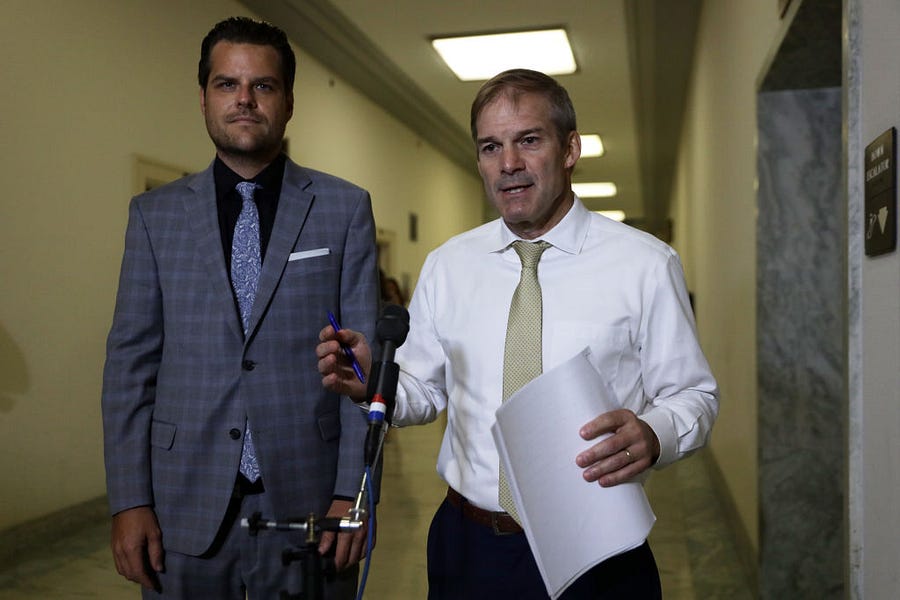It was not quite 10 a.m. on Tuesday when Florida Rep. Matt Gaetz took the microphone at the House Republican Conference meeting and blasted the titular host of the gathering, GOP Conference Chair Liz Cheney. A little more than two hours later, at 12:25 p.m., he posted a tweet about the confrontation, calling for Cheney’s removal. And by 1:25 p.m., Gaetz had recorded, posted, and tweeted a new episode of his podcast, “Hot Takes with Matt Gaetz.”
The intro to the podcast opens with effusive praise for Gaetz from Donald Trump (twice) and Sean Hannity and the segments are broken up with the kind of “sizzle” sound effects you might expect in a home-produced middle school podcast. In the latest episode, Gaetz, who promises his podcast will give a “full-access, behind the scenes look” at Washington, offers a blow-by-blow account of the House GOP meeting Tuesday that most other Republicans would speak about only on background.
Gaetz is blunt about his assessment of the problem: Cheney is insufficiently loyal to President Donald Trump. The Florida firebrand, who has a book out in September from Bombardier Books called Firebrand and last week promoted a new HBO documentary featuring him by tweeting “Move Over Joe Exotic,” suggests that Cheney is seeking publicity and approbation for her disloyalty to Trump. And this, he says, is disqualifying.
“Jim Jordan—my colleague, my mentor, my friend—made the case strongly that Liz Cheney is hurting President Trump,” says Gaetz to open the podcast. “Jim pointed out Liz’s opposition to the president’s Afghanistan policy, the president’s Germany policy, the president’s response to coronavirus, her tweets attacking him and, frankly, her effort to try to oust Republican Thomas Massie.”
On that, at least, Gaetz was right. Jordan did make that case in the Tuesday meeting. Other members of the House Freedom Caucus lined up to take shots at Cheney, too. Rep. Chip Roy, in a competitive race in Texas, complained that Cheney had defended Dr. Anthony Fauci from GOP attacks, providing campaign fodder to his Democrat opponent. Rep. Andy Biggs, the chairman of the House Freedom Caucus, suggested that if Republicans remained in the minority after November, Cheney would share the blame.
For anyone who has followed House Republicans even casually over the past decade, this is a bizarre moment. For several years, the House Freedom Caucus (HFC) served as the ideological enforcer for House Republicans, its members proudly resisting calls for partisan unity in favor of philosophical purity and arguing in favor of shutting down the government rather than more spending or raising the debt ceiling. They fought hard on deficits and spending, pushing Republicans toward fiscal restraint and often publicly chastising party leadership to get their way.
Now, though, the HFC has largely abandoned its role as fiscal conscience of the GOP. Two HFC leaders have gone on to serve as Trump’s chief of staff—Mick Mulvaney and Mark Meadows, who currently holds the job—and the group as a whole has chosen instead to serve as enforcers of loyalty to Trump, whose profligacy rivals Barack Obama’s and who has adamantly opposed reforming the entitlements driving the rapid growth of our national debt. When Trump gave a State of the Union address in January 2018 that failed even to mention the debt or deficits, Meadows told reporters he’d grade the speech an A-plus.
According to several sources in the room, Jordan complained that Cheney wasn’t enough of a Republican “team player,” earning a swift rebuke from Cheney, who hinted at Jordan’s long history of dividing Republicans and said she was eager to see Jordan’s unity once Republicans retake control of the House of Representatives.
Cheney didn’t back down, volleying the attacks as they came in—chiding Gaetz for his upcoming documentary and defending Fauci as the kind of public health professional Republicans should be listening to rather than attacking. It was another display of the independence that made her the target of these attacks in the first place. Cheney has been willing to criticize Trump more often—and more forcefully—than just about any other elected Republican. She tweeted her opposition to holding peace talks with the Taliban at Camp David, after Trump revealed he’d planned to host the jihadists. She went out of her way to voice support for Lt. Col. Alexander Vindman when Trump allies attacked his patriotism and questioned his loyalty to the country. More recently, she publicly defended Fauci as his conflict with Trump was escalating and after Trump mocked mask-wearing, she tweeted a photo of her father, former Vice President Dick Cheney, wearing a mask with the hashtag “#realmenwearmasks.” When the White House was downplaying a New York Times report that Russia had offered bounties for killing U.S. soldiers in Afghanistan, Cheney demanded answers, tweeting:
In talking to numerous Republican House members Tuesday, it was hard to escape the conclusion that the sustained attack on Cheney was a preview of the post-election battles that will define the Republican party. Those members who have thrown in entirely with Trump have shown little tolerance for any views that might differ from those coming from the White House. Cheney has been supportive of Trump in many respects—defending him on impeachment, praising his elimination of Qassem Suleimani, endorsing his re-election. But it’s not enough. TrumpWorld demands 100 percent fealty, 100 percent of the time.
So when Gaetz tweeted yesterday that Cheney “has worked behind the scenes (and now in public) against @realDonaldTrump and his agenda,” he won a retweet from Donald Trump Jr., who added: “We already have one Mitt Romney, we don’t need another… we also don’t need the endless wars she advocates for.” Not surprisingly, Rand Paul jumped in with a tweet of his own, demagoguing Cheney’s views, and John Bolton tweeted his support for her.
Republicans have long understood that such battles are inevitable. And as Trump’s re-election has seemed less and less likely, some elected GOPers have shown a willingness to contradict the White House line. Asked by The Dispatch’s Declan Garvey for a comment on Trump’s threat to veto legislation that requires renaming facilities honoring confederate soldiers, Sen. Ben Sasse made a clear mocking reference to Trump’s disparaging remarks about John McCain, when he said: “Call me old fashioned, but I like generals who weren’t traitors.” And as the president’s poll numbers have suffered, other Republicans have shown more willingness to create some distance with Trump.
Interestingly, even Gaetz seems to understand that there are more traditional conservatives than Trump acolytes. “I do suspect that Liz still has substantial respect within the Republican conference,” he said, shortly before another sizzle,”because we got a lot of people in the Republican conference who aren’t the biggest supporters of the president.”
Photograph of Reps. Matt Gaetz and Jim Jordan by Alex Wong/Getty Images.







Please note that we at The Dispatch hold ourselves, our work, and our commenters to a higher standard than other places on the internet. We welcome comments that foster genuine debate or discussion—including comments critical of us or our work—but responses that include ad hominem attacks on fellow Dispatch members or are intended to stoke fear and anger may be moderated.
You are currently using a limited time guest pass and do not have access to commenting. Consider subscribing to join the conversation.
With your membership, you only have the ability to comment on The Morning Dispatch articles. Consider upgrading to join the conversation everywhere.